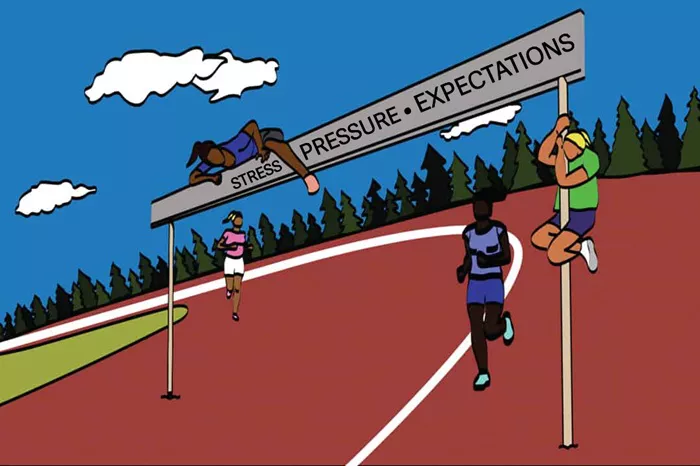“It feels like I’ve got nothing left. I can’t even muster the energy to drink a glass of water. It’s like I’ve been hollowed out. We spend so much time and energy preparing for glory, but now that I’m living with it, I just feel weak and helpless.”
These poignant words, spoken by an anonymous athlete weeks after competing in the Olympic Games, reveal the often-overlooked mental toll that elite competition takes on sportspeople. The 2024 Olympics may have ended, but for many athletes, the challenges are far from over. As they struggle to adapt to life beyond the intensity of competition, serious mental health consequences loom large.
The Mental Strain of Elite Competition
Every athlete constructs their identity through their experiences, values, and the relentless pursuit of success. The significance they attach to their efforts, expectations, and sacrifices profoundly impacts their behavior, motivation, memories, and overall well-being. However, when the competition ends, these athletes often find themselves adrift, grappling with a loss of purpose that can lead to severe mental health issues.
Data from the International Olympic Committee in 2023 highlights the gravity of this situation. A staggering 33.6% of elite athletes suffer from anxiety and depression, and 26.4% experience severe mental health problems after retiring from their sports careers. The intense identification with their athletic goals, coupled with the immense pressure to perform, often leads athletes to neglect other aspects of their lives, such as maintaining relationships and a social life. This all-consuming focus on competition leaves them vulnerable to feelings of emptiness and despair once the games are over.
The Case of Tori Bowie: A Tragic Reminder
The tragic case of American athlete Tori Bowie serves as a stark reminder of the mental health struggles faced by athletes. A triple Olympic medalist at the 2016 Rio Games and multiple world champion, Bowie battled mental health issues as she adjusted to life off the track. She died at the age of 32 from complications during childbirth, a heartbreaking loss that underscores the importance of mental health support for athletes.
Another example is Jesús Rollán, a double Olympic water polo champion who died after falling from a rooftop following his retirement—a death many believed to be suicide. These cases highlight the devastating consequences of unaddressed mental health issues among athletes.
The Psychological Crash After the Spotlight
As soon as a competition ends, it’s common to hear athletes, whether they won a medal or not, talk about “what’s next” or what they could have done better. This relentless pursuit of perfection often prevents them from acknowledging and celebrating their achievements. The moment they stop competing, many athletes face a psychological crash. Their routines, outlooks, and surroundings change drastically, and the immediate goals that once drove them disappear. The media attention that once validated their sacrifices also fades away, leaving them to confront an overwhelming sense of loss.
This phenomenon, known as the “achievement trap,” can be particularly dangerous. If athletes don’t approach this transition with a clear mind, they risk becoming dependent on the rewards and recognition they once received, leading to a significant decline in their well-being.
Rediscovering Life Beyond Competition
However, this post-competition period also offers a unique opportunity for athletes to rediscover themselves. It’s a time to embrace the values that have driven their success, such as humility and responsibility, and apply them to new areas of life. Despite the discomfort and vulnerability that come with this transition, it can be a time of personal growth and self-discovery.
For athletes, this is a chance to focus on their health, reconnect with loved ones, explore new hobbies, and experience life outside the competitive bubble. It’s also an opportunity to see sport from a different perspective—whether through observing how children play, supporting amateur athletes, or witnessing the role of sport in rehabilitation from illness or injury.
“When all the noise is over, that’s when you realize you’ve been fighting for much more than medals,” reflects an anonymous athlete, weeks after competing in the Olympics. “You’ve been pushing yourself for something that sometimes feels like you didn’t even decide to do, and you didn’t even know why you wanted it.”
This profound insight encapsulates the internal battle many athletes face after the Olympics—a struggle that is often more challenging than the fight for medals. As they transition into the next phase of their lives, the support and understanding they receive will be crucial in helping them navigate this difficult journey.
[inline_related_posts title=”You Might Be Interested In” title_align=”left” style=”list” number=”6″ align=”none” ids=”10882,10745,11145″ by=”categories” orderby=”rand” order=”DESC” hide_thumb=”no” thumb_right=”no” views=”no” date=”yes” grid_columns=”2″ post_type=”” tax=””]

































